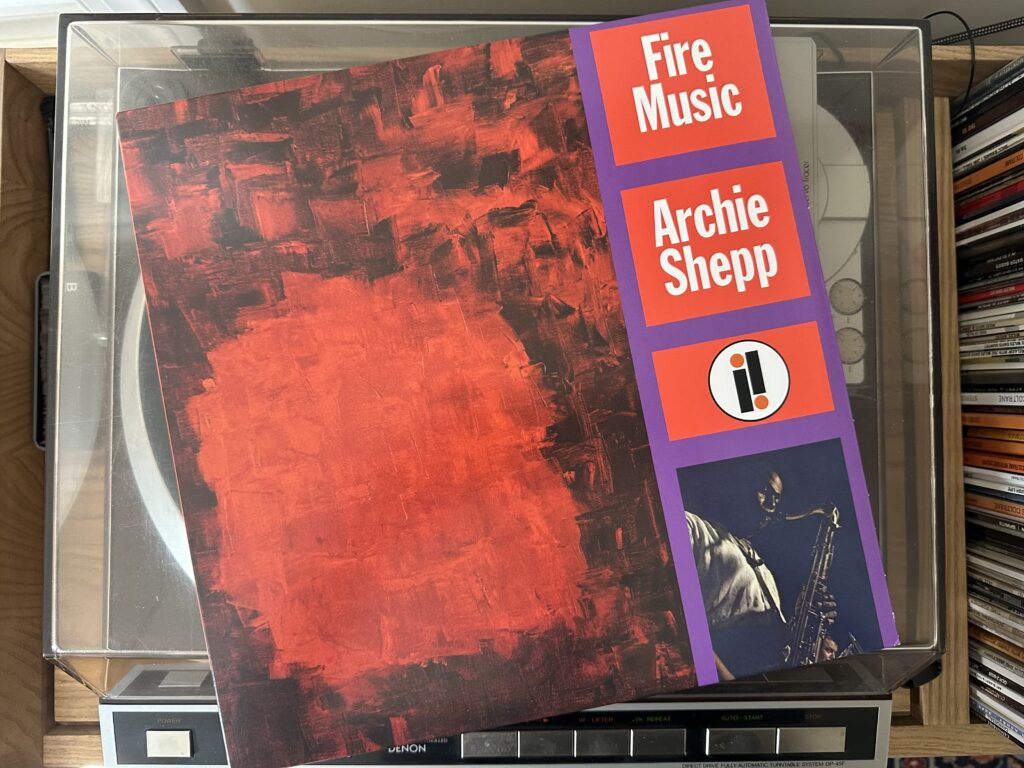
Album of the Week, March 23, 2024
Without John Coltrane, Archie Shepp’s career would have been very different. We’ve already encountered the young saxophonist in the liner notes of A Love Supreme, where Trane mentioned recordings made with Shepp that wouldn’t see the light of day for many years. But Shepp would never have recorded his sessions for Impulse! Records as a leader without Coltrane’s recommendation to producer Bob Thiele.
Shepp had been trying to talk to Thiele for months, to convince him to record Shepp, but over a three month period Shepp was repeatedly told that Thiele was not available; he was “gone out to lunch” or “gone home and not coming back.” Finally Shepp asked Trane to intercede, and Thiele said, “You guys are avant-garde… If you do this recording you’ll have to record all of John’s music.” That led to Shepp’s first album for impulse, Four for Trane, which was viewed as a milestone record that illustrated the depth of Coltrane’s compositions.
For Fire Music, Shepp put together a band consisting of Ted Curson (who had played with Cecil Taylor) on trumpet, Joseph Orange on trombone, Marion Brown (who appeared with Shepp on Trane’s Ascension) on alto saxophone, Reggie Johnson (who would later play with Keith Jarrett, Art Blakey, Sun Ra, Lonnie Liston Smith, Bobby Hutcherson, and others) on bass, and Joe Chambers on drums; David Izenson and J.C. Moses replace Johnson and Chambers, respectively, on the third track of the album. The band entered the Van Gelder Studios in Englewood Cliffs, New Jersey on February 16 and March 9, 1965, just months after the recording of A Love Supreme in that same space (and more than half a year before Trane played the suite live in Seattle).
“Hambone” is the longest and most ambitious of the works on the album. One of the three Shepp compositions that make up the first side, the work is structured around two different themes and features both tight group performances and extended solos from Orange, Curson, Brown and Shepp. The soloists perform freely against an extended riff from the band that morphs into the second theme, a blues riff that sees the band lay down alternating strutting melodic solos, before the first theme returns.
“Los Olvidados” is another densely written group track, with an extended drum solo from Chambers introducing the improvisational middle section, which features a blazing trumpet solo from Curson and a distinctive tenor solo from Shepp that seems to bleat, cry and prophesy all at once. The moving “Malcolm, Malcolm – Semper Malcolm” follows. Shepp’s original poem, recorded just weeks after Malcolm X’s assassination, is recited by Shepp, accompanied by David Izenson and J.C. Moses on bass and drums. “We are murdered in amphitheaters, on the podium of the Audubon,” says Shepp, and then plays a mournful solo over a cello-like arco bass line from Izenson and the crash of Moses’s drums.
“Prelude to a Kiss” returns to the stacked brass chords of the beginning of the album and features a genuinely Ellingtonian solo from Shepp. This leads, via a riff by Orange on the trombone, into “The Girl from Ipanema,” definitely the oddest work on the album. After a freely played intro, the brass section collectively plays the famous “tall and tan and dark and lovely” melody over a samba rhythm from Chambers before Shepp solos on the melody in his distinctive tenor sound. Besides Trane’s sheets of sound, Shepp also brings a rough edged energy to his solos, shaped into bursts of energy that growl like shouts from an angry preacher.
Fire Music is a profound introduction to Archie Shepp, both melodic and hair-raisingly free. It showcases Shepp’s talents at writing for larger groups and his willingness to explicitly lean into more political content. We’ll hear both of those as well as an evolution of Shepp’s sound in the next album he released for Impulse, next week.
You can listen to this week’s album here:
